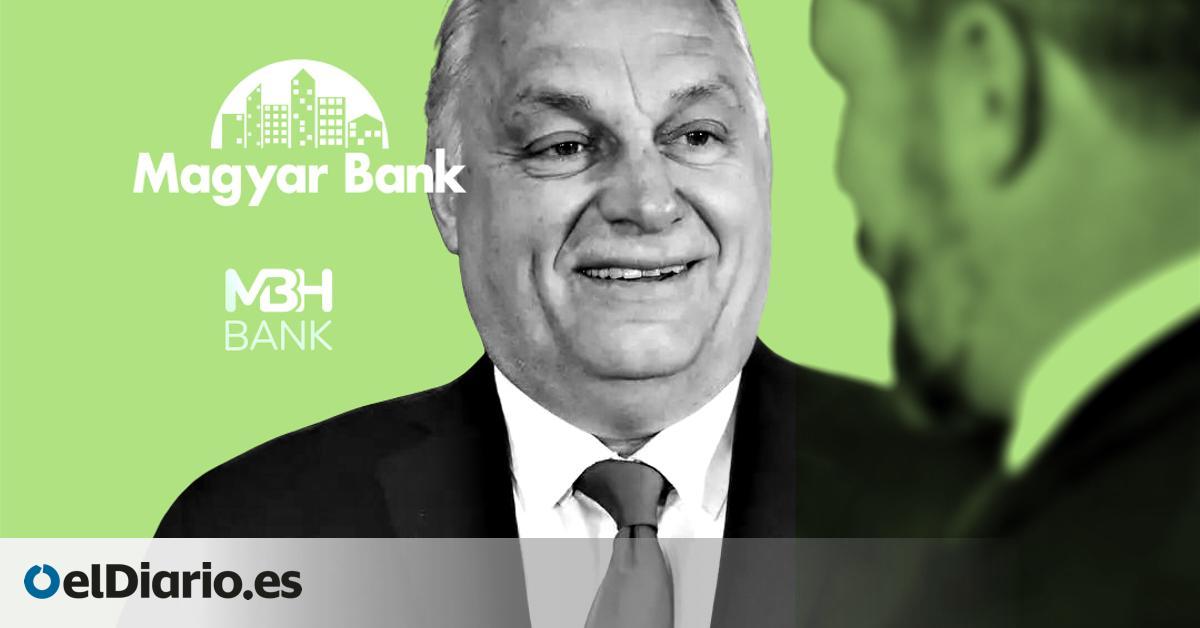
The Hungarian bank accused of financing Vox has as its largest shareholder Corvinus International Investment, an investment firm 100% controlled by the Hungarian State chaired by Viktor Orbán. It is also one of the firms that were behind the public takeover bid (OPA) launched by Magyar Vagon for the train manufacturer Talgo, which the Government vetoed for reasons of “national security”.
Vox received a loan of more than 9 million euros in 2023 to face the electoral processes, as elDiario.es published in this topic. At that time, the spokesperson for the formation, José Antonio Fúster, refused in a press conference to give more information about this financing and assured that the origin of this credit “is known by whoever has to know, the Court of Accounts.” Following this information, the investigative medium Vsquare has directly pointed out a financial entity: MBH Bank, “a financial giant formed from the merger of three entities” and which is in part “owned by Lőrinc Mészáros, the richest businessman from Hungary and a childhood friend of Orbán,” according to this publication.
Vox has confirmed to elDiario.es that it has requested financing from foreign entities, without revealing which ones. However, Europa Press assures that “sources from the Vox Executive acknowledge having requested a loan of just over nine million to finance the campaigns for the 2023 municipal and general elections from the Hungarian bank MBH.”
“We can confirm that Vox has requested loans from foreign banks after numerous Spanish banks, entities that lend money to the Popular Party and PSOE, have refused to lend money to Vox. We have a list of almost 25 banking entities that lend money to PP and PSOE and that deny it to Vox,” sources from the party led by Santiago Abascal tell elDiario.es.
Likewise, they add that “we can confirm that we have asked the banks for money due to the delay – we do not know if deliberate – of the Government in returning the electoral expenses to the parties. And we can confirm that these loans are already paid at the end of 2023. And we wonder why there are Spanish entities that refuse to lend money to a party that three million people vote for. Why do they reject the money that it would take to arrange these loans? Why do they refuse to profit? Is it logical that banks try to influence politics in that way?”
For her part, Pepa Millán, spokesperson for Vox in the Congress of Deputies, has also acknowledged that Hungarian financing was used. “I don’t know if that bank is close to Orbán or not, I know it is a Hungarian bank,” he said in statements to the media. “Given the impossibility of obtaining this loan, which all political parties obtain, especially during electoral times, and given the delay, we do not know if deliberate or not, of the General Administration of the State with those electoral expenses that correspond to any political party and the impossibility, since no bank was open to lending it to us, so we went to a Hungarian bank.”
What the Party Financing Law says
In the event that Vox has been financed through a bank controlled by a State, in this case that of Hungary, it could amount to a breach of the Law on the financing of political parties.
Specifically, this establishes that “the parties may not accept any form of financing from foreign governments and organizations, entities or public companies or from companies directly or indirectly related to them”, as reflected in its Article 7. In this case, it would be financing by a bank whose first shareholder is the Hungarian State.
The Law also reflects that “political parties” may receive non-finalist donations from foreign natural persons, with the limits, requirements and conditions established in this law for private contributions, and provided that the requirements are also met. of the current regulations on exchange control and capital movement.
A bank owned by the State as a result of a merger
The designated Hungarian bank, Magyar Bankholding (MBH Bank) is the largest lender in the country. It is the result of a three-way merger and has Corvinus International Investment as its first shareholder, according to its 2023 annual accounts. Specifically, Corvinus owns just over 30% of the capital. It is a bank that has nearly 2.4 million clients, more than 500 offices and the equivalent of more than 19 billion euros in deposits, according to its website.
The entity itself recognizes, when talking about the merger process that it has carried out in recent years, that it is in state hands. “The Hungarian State owns 30.35% of the shares through Corvinus International Investment,” he acknowledged when talking about the integration of Budapest Bank Group and MBH Bank. Subsequently, it completed its integration with Takarékbank. In this sense, two entities linked to the latter – Magyar Takarék Befektetési és Vagyongazdálkodási and Magyar Takarék Holding – appear as the second and third shareholders of the bank, with 25% and 12.5% of the capital, respectively, according to the aforementioned annual accounts. . Two other firms appear in this shareholding, Metis Magántőkealap and Global Alfa Magántőkealap with a control of 11.5% and 3.29%.
The latter would be linked to Lőrinc Mészáros, a personal friend of Orbán, according to information published by VsQuare. The journalist Szabolcs Panyi, author of the information that links this entity with the financing of Vox, also mentions in statements to elDiario.es another firm that appears in the shareholding of MBH Bank: Blue Robin Investments, with 10.8%. The latter would be linked to György Matolcsy, “a former ally of Orbán, with whom he is now in conflict,” says Panyi.
This is not the first time that the role of the Hungarian state in MBH Bank has been discussed. This article published by the Financial Times already explains how the Orbán Government has promoted the integration of Magyar financial entities to create a large national bank with the capacity to influence abroad and carry out its own agenda. Sources from the Executive assured the British media that the fact that the State has 30% of the bank’s capital means that “there is not and cannot be political influence in its daily operation” and that it was “subject to the same legal framework and operational standards quite stricter than any national bank.”
Journalist Szabolcs Panyi also explains to elDiario.es that the Corvinus state fund “is used by the Government” of Orbán “mainly for acquisitions and international businesses.” “Recently, for example, the Hungarian Government together with the French airport operator Vince bought the Budapest airport,” he points out. “Corvinus is basically the Hungarian State,” he summarizes.
Behind the takeover bid for Talgo
Corvinus was one of the firms behind Magyar Vagon’s bid for Talgo. In the documentation that was sent to the National Securities Market Commission (CNMV), where it explained the offer, it was detailed that the vehicle that made the acquisition proposal was Ganz-Mavag Europe Zrt. Of this firm, 55% of the capital was in the hands of Ganz-Mavag Holding and the other 45% of Corvinus Zrt. (Corvinus International Investment Private Limited Company). “Corvinus is a company controlled entirely by the Hungarian State,” he acknowledged to the market supervisor. “The rights to this property are exercised by the Hungarian Ministry of National Economy,” he stated.
On August 30, the Hungarian group Ganz Mavag (Magyar Vagon) withdrew the takeover bid for Talgo, which valued the train builder at 620 million euros. He took that step back after the Government vetoed the operation.
“The analysis carried out has determined that the authorization of this operation would entail risks to guarantee national security and public order. In this context, the Council of Ministers has declared the information contained in this file as classified,” the Executive summarized. “For the Government, Talgo is a strategic company within a key sector for the economic security, territorial cohesion and industrial development of Spain,” he concluded.
Source: www.eldiario.es

